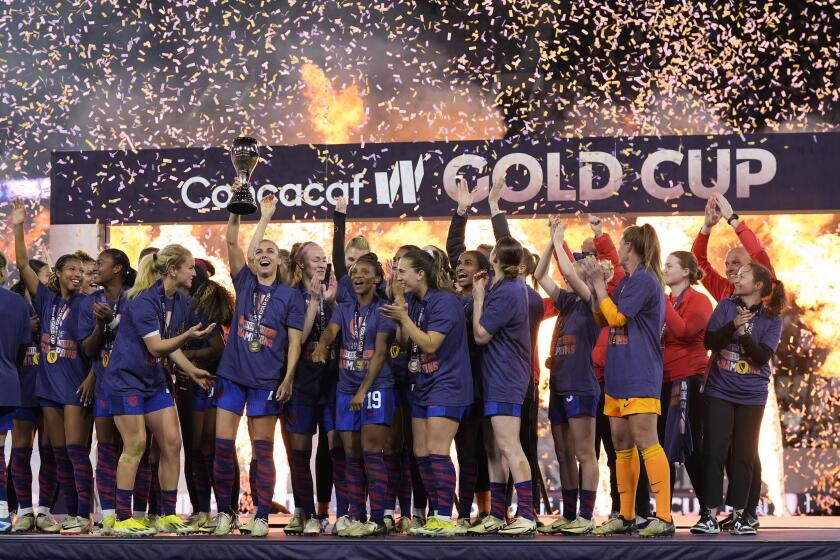Results seem positively unbelievable
BEIJING -- Four years ago in Athens, 26 Olympians tested positive for performance-enhancing drugs, which most agree was only a fraction of those who had artificial help gushing through their bloodstreams.
This weekend in China, Ukrainian weightlifter Igor Razoronov submitted a dirty test. He was only the sixth athlete busted at these Summer Games, representing quite a falloff from the 2004 total.
There really aren’t many conclusions for us to draw here. The athletes have either been scared clean, or they’ve stayed ahead of the drug-testers.
Think what you want, but with more than 10,000 athletes competing in the Olympics this time around, if you think only a half-dozen have blood that matches Beijing’s air quality, well, I suspect the International Olympic Committee might have a public relations job for you.
Despite the drop in positive tests, we’ve actually seen a fair number of superhuman performances, athletes who are rewriting the Olympic record book like Quentin Tarantino taking a crack at remaking “Little House on the Prairie.”
Last week I cast skepticism on Jamaican sprinter Usain Bolt’s incredible feats at these Olympics -- shattering the world records in both the 100 and 200 meters. Not surprisingly, there were some who disagreed, who want to believe that Bolt earned that record through hard work, powerful homegrown yams and his pre-race Chicken McNuggets. Admittedly, I’d love to believe that too. Unfortunately, I just can’t.
Yet, there was one other unbelievable performance at these Games. Years from now, we’ll look back at 2008 in Beijing and two things will stand out: Bolt’s lightning speed around the Bird’s Nest track, and Michael Phelps assuming superhero powers in the Water Cube pool.
In eight events, Phelps set seven world records, several by ridiculously large margins. In winning eight gold medals, he did something no one had ever done before. So why does Phelps receive the benefit of the doubt but not Bolt? It’s a fair question.
Put simply, Phelps’ growth curve is a bit different and the testing standards for his home nation are significantly different.
Bolt entered these Games as a curiosity, while Phelps had long ago established himself as swimming’s version of a bull in a world-record shop.
Phelps was an age-group champion since the time he learned to hold his breath underwater. When he was 11 years old, his coach, Bob Bowman, was already convinced he’d someday be an Olympic champion. In 2000, Phelps was the youngest male Olympian since 1932. A year later, he became the youngest swimmer to break a world record. His path was always pointed to a historic performance like we saw this month in Beijing.
This isn’t to suggest that Bolt wasn’t also a rising star (in fact, at 16, he was the youngest world champion ever). But their respective paths were different. For most of his competitive life, when Phelps wasn’t performing in the swimming pool, he was performing for doping officials behind closed doors.
“I’ve been tested after every final session and a few preliminary sessions I’ve been doing since I got here, and in Singapore and at the training camp in Palo Alto,” he said last week. “From the trials to now, I’d say by a rough estimate there’s been 40 tests. That’s a bunch. But it’s part of the game and good for the sport to have it.”
For the sake of accuracy, Bolt has also faced plenty of tests. After winning his third gold medal of these Games, here’s what he said: “I’ve been tested so many times in the competition I’ve lost count. We know we’re good, we know we’re clean. We work hard and any time you want to test us, it’s OK.”
Here’s the difference: The United States has a much more stringent testing program. Jamaica doesn’t even have an accredited anti-doping system. The only times many athletes there -- and in many other countries -- are tested is when they’re in actual competition.
Not helping matters, four of the last five 100-meter gold medalists have been linked to performance-enhancing drugs. By comparison, the sport of swimming has the steroid stain of a suburban preschool.
“Anybody is able to say whatever they want,” Phelps said during his chase for eight. “I know for me, I am clean.
“I did Project Believe with USADA, where I purposely wanted to do more tests to prove it. People can question it all they want, but the facts are the facts. And I have the results to prove it.”
To be fair, Project Believe isn’t fool-proof either. Project Believe is a testing program in which certain athletes volunteer for additional -- non-mandated -- testing. It covers 12 athletes, including Phelps, Dara Torres and Tyson Gay.
In all, more than 5,000 drug tests will be conducted at these Summer Olympics. Catching only a handful doesn’t tell me that the Games are suddenly clean. Unfortunately, it probably confirms our fears: The athletes are still light-years ahead of the drug testers.
More to Read
Go beyond the scoreboard
Get the latest on L.A.'s teams in the daily Sports Report newsletter.
You may occasionally receive promotional content from the Los Angeles Times.





